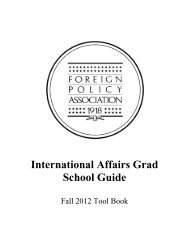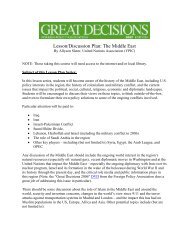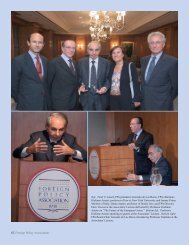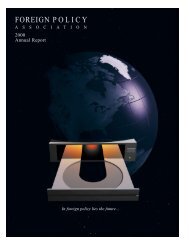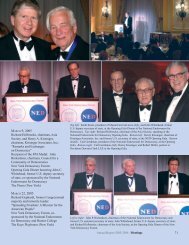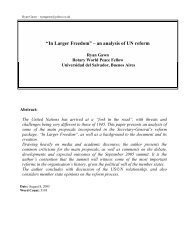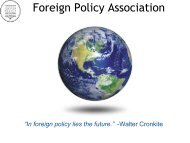Celebrating 90 Years - Foreign Policy Association
Celebrating 90 Years - Foreign Policy Association
Celebrating 90 Years - Foreign Policy Association
You also want an ePaper? Increase the reach of your titles
YUMPU automatically turns print PDFs into web optimized ePapers that Google loves.
with the realization that we cannot survive if<br />
we do not talk to each other and if we do not<br />
build bridges. It is important that our common<br />
history has known more ups than downs.<br />
Whatever turns our relations took, they always<br />
highlighted the great future for both the United<br />
States and Russia that Alexis de Tocqueville<br />
foresaw.<br />
Russia underwent transformations in the<br />
19<strong>90</strong>s that removed the grounds for ideological<br />
incompatibility and confrontation in Russian-<br />
American relations. These transformations<br />
opened up new and unprecedented prospects<br />
for our cooperation. The experience of working<br />
together over the past few years demonstrates<br />
that given the political will, mutual respect,<br />
and equal treatment, we can fully realize the<br />
potential of our cooperation. The presidencies<br />
of Vladimir Putin and George W. Bush, their<br />
mutual personal commitments—chemistry, if<br />
you like—and commitment to developing the<br />
partnership opened a new page in our history<br />
and in our relations. When uncertainties of<br />
the 19<strong>90</strong>s were left behind and we overcame<br />
vestiges of the past, Russia had to make some<br />
very hard decisions that became a kind of<br />
investment in our common future.<br />
Russia’s response to the 9/11 terrorist<br />
attacks gave strong political momentum to<br />
our relations, adding an emotional dimension<br />
and prompting recollections of our alliance<br />
during World War II. There were joint efforts to<br />
topple the Taliban regime in Afghanistan, with<br />
Russia helping with the provision of military<br />
transit through its territory and helping to get<br />
permission for such transit through the territory<br />
of its allies in Central Asia. All this served as<br />
a very powerful uniting factor. There was also<br />
progress in trade and economic relations, which<br />
includes the energy sector. Even our well-<br />
known differences over the Iraq war could not<br />
stall progress.<br />
At the same time that Russia was<br />
regaining its strength, it was faced with<br />
increasing pressure from the outside to insure<br />
free access to Russian oil and gas resources,<br />
as well as to influence its internal political<br />
development. I want to be very clear: I do not<br />
support the claims that there was a deliberate<br />
outside strategy vis-à-vis Russia, but we are<br />
all very aware that in politics, the perception<br />
sometimes matters more than reality itself.<br />
Moreover, a new trend in our relations<br />
emerged against the background of additional<br />
important developments, including those in the<br />
very sensitive area of strategic stability, when<br />
the United States unilaterally started a revision<br />
of our common achievements in the field of<br />
development and arms control. The United<br />
States withdrew from the ABM [Anti-Ballistic<br />
Missile] Treaty, and the future of another<br />
important instrument, the START [Strategic<br />
Offense Reductions Treaty] was put into<br />
question. In American political parlance, it was<br />
called the Cold War legacy, and regrettably,<br />
we now have to think how to prevent growing<br />
alienation between us. I would like to stress<br />
this point: there are no objective reasons for a<br />
new confrontation, only mutual aloofness. We<br />
will not succeed in our national interests unless<br />
we reach a common perception of the world<br />
we live in and of the shape of things to come.<br />
After the end of the Cold War, Russia<br />
could not afford the luxury of self-delusion.<br />
We could not be mistaken regarding the new<br />
reality and had to accept it, however difficult<br />
the psychological adaptation may have been.<br />
We gave up an ideology and chose pragmatism<br />
and common sense, building our foreign policy<br />
on sound national interests. I believe that we<br />
have found ourselves in the mainstream of<br />
international life.<br />
FOREIGN POLICY ASSOCIATION | 71<br />
MEETINGS: PRESENTATION BY SERGEY VIKTOROVICH LAVROV



